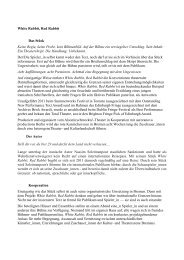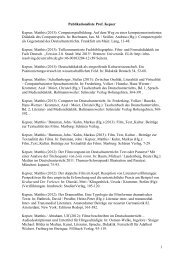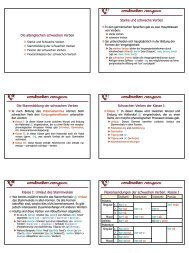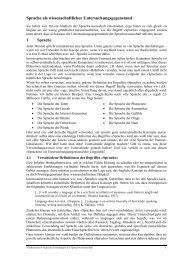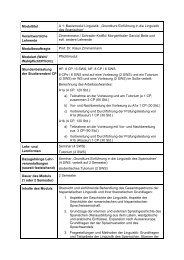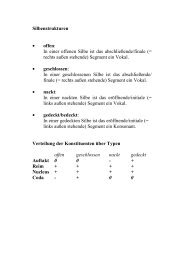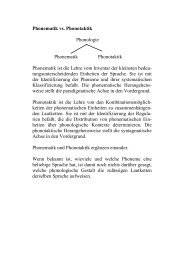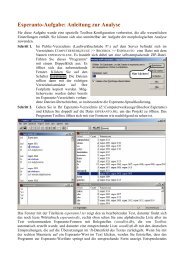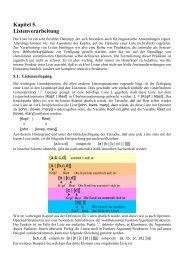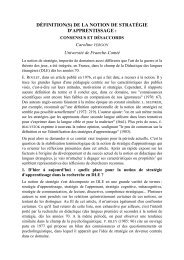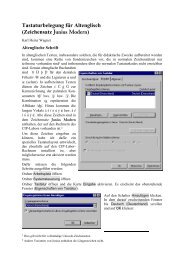Relativism and Universalism in Linguistics - Fachbereich 10 ...
Relativism and Universalism in Linguistics - Fachbereich 10 ...
Relativism and Universalism in Linguistics - Fachbereich 10 ...
You also want an ePaper? Increase the reach of your titles
YUMPU automatically turns print PDFs into web optimized ePapers that Google loves.
Wednesday, August 30, 2006<br />
Section D: Pronouns<br />
Conference room: GW1 A0150<br />
11:30–12:00 Acuña Fariña, Juan Carlos (University of Santiago de Compostela, Spa<strong>in</strong>)<br />
Activeness <strong>and</strong> the M<strong>in</strong>imal Cha<strong>in</strong> Pr<strong>in</strong>ciple: Spanish se reflexives, passives<br />
<strong>and</strong> impersonals do not wait even for m<strong>in</strong>imal cha<strong>in</strong>s<br />
12:00–12:30 Cerrón-Palom<strong>in</strong>o López, Alvaro (University of Southern California)<br />
Subject Resumptive Pronouns <strong>in</strong> Spanish Relative Clauses: <strong>Universalism</strong> or<br />
<strong>Relativism</strong>?<br />
12:30–13:00 Helmbrecht, Johannes (Univeristy of Erfurt)<br />
Personal pronouns - a corpus analysis <strong>and</strong> its implications for language<br />
typology<br />
Lunch break<br />
15:00–15:30 Siewierska, Anna (Lancaster University) / Hollmann, Willem (Lancaster<br />
University)<br />
Expla<strong>in</strong><strong>in</strong>g the my vs. me variation <strong>in</strong> Lancashire dialect: a usage-based<br />
grammar.<br />
15:30–16:00 Lai, Vicky Tzuy<strong>in</strong> (University of Colorado, Boulder)<br />
Pragmatic Functions of First Person S<strong>in</strong>gular Pronouns <strong>in</strong> Classical Ch<strong>in</strong>ese<br />
16:00–16:30 Razímová, Magda (Charles University, Prague)<br />
System of Pronom<strong>in</strong>al Words <strong>in</strong> Czech with Respect to German <strong>and</strong> English*<br />
Activeness <strong>and</strong> the M<strong>in</strong>imal Cha<strong>in</strong> Pr<strong>in</strong>ciple:<br />
Spanish se reflexives, passives <strong>and</strong> impersonals do not wait even<br />
for m<strong>in</strong>imal cha<strong>in</strong>s<br />
Acuña Fariña, Juan Carlos<br />
University of Santiago de Compostela, Spa<strong>in</strong><br />
iacanoe@usc.es<br />
De V<strong>in</strong>cenzi´s (1991, 1996, 1998) M<strong>in</strong>imal Cha<strong>in</strong> Pr<strong>in</strong>ciple (MCP) postulates a preference by<br />
the human parser to opt for structures with no movement over compet<strong>in</strong>g structures with<br />
(hypothesized) movement. The general idea of the MCP is that displacement is costly for the<br />
m<strong>in</strong>d because it delays phrasal packag<strong>in</strong>g. The reason for this is that resources need to be<br />
spent on ‘undo<strong>in</strong>g’ movement <strong>and</strong> reconstruct<strong>in</strong>g an underly<strong>in</strong>g SVO template before the<br />
right who-did-what-to-whom order can be sent to a semantic component for post-syntactic<br />
analysis. As conceived, the MCP works as follows: on recognis<strong>in</strong>g a gap the parser <strong>in</strong>itiates<br />
an active search for a filler <strong>and</strong> preferentially construes any displaced phrase as one. Here I<br />
argue that the activeness of an MCP type of processor is unnecessarily constra<strong>in</strong>ed by the<br />
MCP grant<strong>in</strong>g <strong>in</strong>visibility to any phrase that occupies a lawful deep structure position. Data



